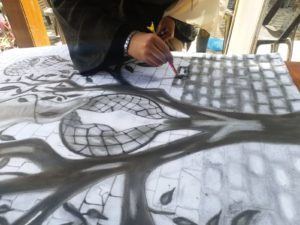[Gaza City] On stage at the Bader Association in central Gaza City, eight attractive young women, wearing traditional Palestinian embroidered thobe tunics, sing national and folk songs to commemorate Land Day, to warm applause from the audience and looks of pride and encouragement from their families.
The Mashael Alfan, or Torches of Art band is made up of 15 young women who say they “sing to revive Palestinian heritage.”
The band is part of the larger Mashael Alfan artistic group that includes nearly 60 gifted females between the ages of four and 25 who sing, draw, recite poetry and perform the traditional Palestinian dabke circle and line dance.
Haidar Alaf, who founded the Mashael for Artistic Production team in 2016, told The Media Line the idea for the arts organization is “based on the girls’ need to have a special group through which they could highlight their multiple talents and employ them in the service and protection of the Palestinian culture and heritage in light of the continuous and public Israeli attempts to obliterate the Palestinian identity and steal the traditional cultural heritage.”
That’s why, he continued, “we try, in all our performances, to focus on features of our Palestinian culture by exclusively wearing traditional Palestinian clothes, singing folk and patriotic songs, drawing meaningful freedom symbols, and performing the Palestinian dabke dance.”

A female Palestinian artist draws freedom symbols as part of the Mashael for Artistic Production program at the Bader Association in central Gaza on March 31, 2022. (Hazem Albaz for The Media Line)
Sabreen Abu Samra, 19, one of the female singers, told The Media Line the major reason she joined the band is to support and revive the Palestinian traditional legacy.
“Our heritage is the evidence of our existence and the basis of our history as Palestinians in general, and as women in particular. I advise girls who have talents to face their fears, work hard to develop themselves, and adhere to their Palestinian identity, because our land depends only on us,” she said.
Abu Samra emphasizes that full family support and the musical coach’s directions were key to the band’s great success.
She notes that the significantly positive interaction of the public and the audiences’ encouraging reactions toward the female presence on stage were more surprising.
It’s an unfamiliar phenomenon in such a conservative society, which normally places greater restrictions on female participation, especially in cultural life, according to the Palestinian artist and director Hazem Abu Hmaid. But a fundamental change in the Gazan mentality seems to be nearing, he says.
Abu Hmaid, one of the first to integrate the female element in artistic works and cultural plays in Gaza, told The Media Line that “Palestinian society has begun to understand and accept the presence of Palestinian women in the artistic arena, after it was rejected for a long time. Today we can see proud fathers urging their daughters to participate in cultural activities while giving them unconditional support and love.”
He attributes this shift to the responsible attitude of the artmakers.
“In our artistic works, we are still conservative, whether in dress or in artistic content, taking into account ethical and social standards, which encouraged fathers to give their daughters the trust, and motivated them to accept the presence of women in all fields,” he said,
Abu Hmaid believes the Gazan community is going through an important turning point in its way of thinking.
However, Yasser Omar, a well-known Palestinian composer, disagrees, saying there has been no significant change in the Gazan mentality so far.
He told The Media Line that Gazan “society can accept women’s participation in everything related to heritage and folklore activities such as singing and dabke dancing. However, there are still wide restrictions on female participation in performing emotional songs as society looks with suspicion on women who dare to do it.”
According to Omar, the spread of female cultural and arts groups such as Mashael Alfan is absolutely a way to empower and activate women’s roles in society away from the traditional stereotypes that restrict them to certain roles.
Shahed Allali, 14, is the youngest singer in the Mashael Alfan band.
“Since joining the team, my whole personality has changed for the good. Now I’m stronger, more confident on stage, and with better communication skills. I sing with all my heart for my land, my heritage, and my identity,” she told The Media Line.
The members of the band have participated in many events throughout the Gaza Strip, but they aspire to overcome Israeli restrictions on movement in order to reach international forums and to share the Palestinian traditional production with the world, Alaf said, signaling the importance of music in supporting the Palestinian cause.
“Art and music are universal, understandable languages that don’t need translation. Thus, when Palestinian arts travel abroad, they carry our history, our struggle, and resilience, and reflect a beautiful image of the Palestinian who loves life and appreciates art and music,” Abu Hmaid said.